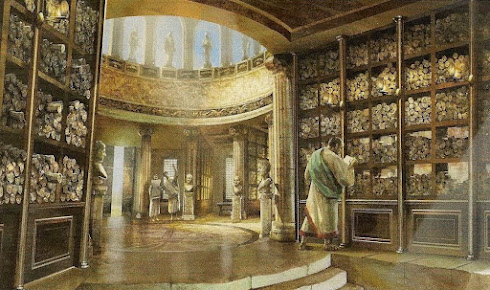"Those
who don't know their history are doomed to repeat it." -Edmund Burke.
The loss of countless years of knowledge, civilization, history, and culture is simply one of the saddest moments in human history. This time, let us rewind time further back to 2,300 years ago, in ancient Greek civilization.
Alexander the Great, a former student of Aristotle, set out on a mission to bring all knowledge in the globe under one roof. The plan was to establish a vast empire of knowledge centered on a city conquered under his name: Alexandria. Although Alexander died before the library was completed, his successor, Ptolemy I, carried out Alexander's plans for a museum and library. In this way, he attempted to legitimize his position as ruler, particularly in the eyes of the Greeks, by emphasizing his personal ties to Alexander (Issa, 1995).
The Library of Alexandria, located in the city's royal sector, was possibly the greatest structure ever created at the time, influenced by native Egyptian sculptures and Hellenistic architecture. Not only did the library provide a political and dynastic advantage, but it also gave Greek inhabitants in Egypt to form a cultural link. Alexandria was the main Greek city in Egypt and within it, there was an extraordinary mix of people from many cities and backgrounds with all different social and religious traditions. Unfortunately, no accounts of its whole construction have survived. Most experts know the building had classrooms, study halls with “wide boulevards laid out in a grid, and buildings constructed of granite and marble”, and, of course, shelves for books and scrolls (Lawler, 2007).
Ptolemy I funded the library and invited scholars to study there, stocked the shelves largely with Greek and Egyptian scrolls. As numerous professors, scientists, and intellectuals contributed their expertise to the library, the city flourished dramatically. Within a few years, the scrolls grew to 400,000 to 700,000 in the collection (Phillips, 2010).
But there was never too much knowledge. The rulers of Alexandria still desired to spread their wisdom and obtain every book in the world. Because Alexandria was strategically positioned for hub ships in the Mediterranean Sea, Ptolemy III enacted a law requiring all ships that docked in Alexandria to turn in their books for copying. After duplicating the scripts, they preserved the originals and returned the copied versions to the owners.
This resulted
in increased business around the city. It gave birth to some of the greatest
inventions in human history: Eratosthenes, the scientist who demonstrated the
Earth's roundness by calculating its circumference; Heron of Alexandria
constructed the first ever steam engine, which was re-invented during the Industrial
Revolution; Euclid who established the first foundations of geometry;
Callimachus, a Greek poet, who wrote over 800 literary works in many genres –
though sadly most of the works did not survive.
Picture: History
of Yesterday
Alexandria prospered and the library thrived for about 300 years after it was founded. So, what happened to it? Why are the sources about the Great Library of Alexandria disappeared from history?
In 48 BCE, Julius Caesar laid siege to Alexandria. This was during the Alexandrian War, which involved Caesar's civil war with Egyptian dynasty struggles. Many historians believe it was a result of setting fire to Egyptian harbor ships and some parts of the building may have caught fire. Historical records, however, state that scholars continued to visit the library centuries after Caesar's siege.
Though the fall of Alexandria might be more complex than that. As Empires rise and fall, so did Alexandria and the rest of the civilization. Society progresses and the library gradually vanished as the city transitioned from Greek to Roman, then to Christian, and finally to Muslim. The fate of Alexandria lay at the hand of its conquerors. Every new regime of rulers viewed its contents as a threat rather than a source of human advancement. Scholars who tried to protect or study these ‘blasphemous teachings’ would face harassment or death (El-Abbadi, 2008).
We are still working to preserve our knowledge and fight to keep our history intact. We believe that digital records might be more resistant to destruction than Alexandria's papers and inks, however, we still need to defeat the more corrupt forces that resulted in the library’s demise: fear of progression and the arrogant belief that the past is forever obsolete.
With the turn of events that destroyed Alexandria, we could perhaps learn from it and prepare for the future of science, discoveries, intelligence, and cultural advancements. We must be careful not to repeat the same dark history that destroyed years of humanity’s accomplishments.
Writer: Radya Ayufa Putri
Editor: Junanda Amriansyah
References
El-Abbadi, M. (2008). What Happened to the Ancient Library of Alexandria? Leiden: Koninklijke Brill NV.
Issa, S. (1995). Culture and Power in Ptolemaic Egypt: The Museum and Library of Alexandria. Greece & Rome 2nd Ser., Vol. 42, No. 1., 38-48.
Lawler, A. (2007, April 27). Raising Alexandria. Retrieved from Smithsonian Magazine: https://www.smithsonianmag.com/science-nature/raising-alexandria-151005550/
Phillips, H. (2010). Great Library of Alexandria. Library Philosophy & Practice, 19.

.png)

Comments
Post a Comment